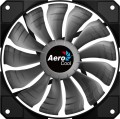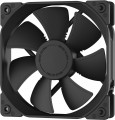Max. air flow
The maximum airflow that a cooling fan can create; measured in CFM — cubic feet per minute.
The higher the CFM number, the more efficient the fan. On the other hand, high performance requires either a large diameter (which affects the size and cost) or high speed (which increases the noise and vibration levels). Therefore, when choosing, it makes sense not to chase the maximum air flow, but to use special formulas that allow you to calculate the required number of CFM depending on the type and power of the cooled component and other parameters. Such formulas can be found in special sources. As for specific numbers, in the most modest systems, the performance
does not exceed 30 CFM, and in the most powerful systems it can be up to 80 CFM and even
more.
It is also worth considering that the actual value of the air flow at the highest speed is usually lower than the claimed maximum; see Static Pressure for details.
Static pressure
The maximum static air pressure generated by the fan during operation.
This parameter is measured as follows: if the fan is installed on a blind pipe, from which there is no air outlet, and turned on for blowing, then the pressure reached in the pipe will correspond to the static one. In fact, this parameter determines the overall efficiency of the fan: the higher the static pressure (ceteris paribus), the easier it is for the fan to “push” the required amount of air through a space with high resistance, for example, through narrow slots of a radiator or through a case full of components.
Also, this parameter is used for some specific calculations, however, these calculations are quite complex and, usually, are not necessary for an ordinary user — they are associated with nuances that are relevant mainly for computer enthusiasts. You can read more about this in special sources.
MTBF
The total time that a cooling fan is guaranteed to run before it fails. Note that when this time is exhausted, the device will not necessarily break — many modern fans have a significant margin of safety and are able to work for some more period. At the same time, it is worth evaluating the overall durability of the cooling system according to this parameter.
Noise level
The standard noise level generated by the cooling system during operation. Usually, this paragraph indicates the maximum noise during normal operation, without overloads and other "extreme".
Note that the noise level is indicated in decibels, and this is a non-linear value. So it is easiest to evaluate the actual loudness using comparative tables. Here is a table for values found in modern cooling systems:
20 dB — barely audible sound (quiet whisper of a person at a distance of about 1 m, sound background in an open field outside the city in calm weather);
25 dB — very quiet (normal whisper at a distance of 1 m);
30 dB — quiet (wall clock). It is this noise that, according to sanitary standards, is the maximum allowable for constant sound sources at night (from 23.00 to 07.00). This means that if the computer is planned to sit at night, it is desirable that the volume of the cooling system does not exceed this value.
35 dB — conversation in an undertone, sound background in a quiet library;
40 dB — conversation, relatively quiet, but already in full voice. The maximum permissible noise level for residential premises in the daytime, from 7.00 to 23.00, according to sanitary standards. However, even the noisiest cooling systems usually do not reach this indicator, the maximum for such equipment is about 38 – 39 dB.
Lighting
The presence
of its own illumination in the design of the cooling system.
The backlight serves a purely aesthetic function — it gives the device a stylish appearance that blends well with other components in the original design. Thanks to this, such cooling systems are especially appreciated by gamers and fans of external PC modding — especially since the lighting can be different, and the most advanced models even provide backlight synchronization with other components (see below). On the other hand, this function does not affect the efficiency and performance, and the overall cost is inevitably affected, sometimes quite noticeably. Therefore, if the appearance does not play a fundamental role for you, the best choice, most likely, will be
a cooling system without backlight.

